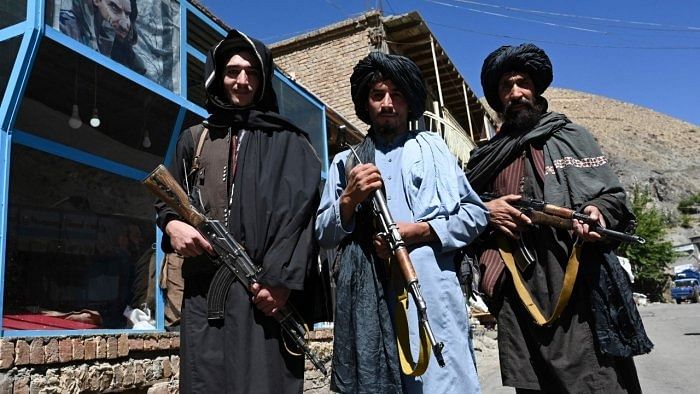
With the exit of US troops from Afghanistan and its takeover by Taliban, the three Sunni Muslim-majority countries — Pakistan, Qatar and Turkey — have initiated engagement with Kabul’s new dispensation.
The proximity of the Pakistani military establishment to the infamous Haqqani clan, who are from Loya (meaning ‘big’ in Pashtu) Patika, in the eastern part of Afghanistan, is a well-documented fact. Most members of the Taliban leadership have studied in Pakistani Deobandi Islamic seminaries. These facts make Pakistan an influential player in Afghanistan.
Along with Pakistan and the United Arab Emirates (UAE), Saudi Arabia was one of the few countries that recognised the Taliban when they assumed power the first time in 1996. Various studies have pointed out that during the “Afghan jihad”, Saudi funding led to the radicalisation of the Deobandi seminaries of Afghanistan and Pakistan with the infusion of its Wahabi ideology, rooted in the Salafi school, a narrow interpretation of Sharia. Outside the region, this time around, Turkey and Qatar are engaging with the Taliban, and this dimension requires more probing than present reports indicate there is.
Qatari and Turkish technicians have reportedly helped the Taliban restart Kabul airport. Recently, Qatar’s deputy prime minister Sheikh Mohammad bin Abdur Rahman Al-Thani, who is also the country’s foreign minister, visited Kabul to meet the Taliban leadership. Turkish President Recep Tayyip Erdogan is also among the few world leaders who have said that their government is open to working with the Taliban.
Qatar has played host to the dialogue between the Taliban and the US since 2011. The family members of some Taliban interlocutors still live in Qatar. Qatar, which has one of the highest per capita incomes in the world, maybe amenable to continue assisting the Taliban, particularly in the humanitarian domain. Due to Taliban’s connection to the 9/11 attacks and domestic political opposition, the US political leadership is likely to abhor any visible engagement with them. However, it may continue to encourage Qatar, which hosts the Al Udeid airbase near Doha, the largest American military outpost in the Middle East, to positively incentivise Taliban and gain some leverage on critical issues, safe passage for potential remaining evacuees, counter-terrorism, women’s rights and other pressing human rights issues.
With regard to Turkey’s role in Afghanistan, it is influenced by history and its own larger foreign policy orientations. Turkey shares the Hanafi school of Sunni Muslim jurisprudence with South Asia and Central Asia. Deobandi Islam, which is the most popular among Pashtuns on both sides of the Durand Line, is a derivative of the Hanafi school. Broadly speaking, the Hanafi school gives more emphasis to the contextualization of Quranic injunctions and creating consensus. One reason for the spread of Deobandi Islam in the Pashtun areas in the 19th century and the early part of the 20th century was that it married neatly into the tradition of consensus-forming among Pashtun tribes, as reflected in the ‘jirga’, a tribal tradition of holding community meetings of male elders.
In addition, Turkey’s involvement in Afghanistan will be tempered by its economic and political interests in the neighbouring Central Asia region. Turkey has some distinct cultural and geographical linkages with Central Asia. Most of the air routes from Europe to the Central Asian countries are through Istanbul. Turkey has sought to create its own sphere of Turkic-speaking countries by forming the Cooperation Council of Turkic-Speaking States, or the Turkic Council. The council, established in 2009, has headquarters in Ankara and it aims to bring various countries linked by Turkic linguistic roots under one umbrella and coordinate in various spheres, including the economy. In Central Asia, three countries — Uzbekistan, Kazakhstan and Kyrgyzstan — are part of the council as the native languages in these countries are of Turkic origin. Russian is also spoken in Central Asia because of its association with the former Soviet Union. The two non-members of the council in the region are Tajikistan, which is Persian-speaking and shares ethnicity with northern Afghanistan, and Turkmenistan, where Turkmen, the native language is of Turkic origin but the political leadership invokes the neutrality principle in order to avoid hurting its equities with Russia.
Tajikistan, Uzbekistan and Turkmenistan share ethnicity with Afghanistan’s northern frontiers. The political elite in Central Asia is perpetually wary of the spread of radicalisation in their own boundaries. Political freedoms are often curtailed, ostensibly to counter the forces of religious extremism. In 2014-15, the highest numbers of foreign fighters that joined the Islamic State in the Syria-Iraq war theatre were from Central Asia, a number reportedly the same as from Western Europe. A number of extremists from Central Asia are already present in Taliban-ruled Afghanistan. In addition, Qari Fasihuddin, a Tajik from Afghanistan, is the acting army chief of Taliban. Fasihuddin belongs to the Badakhshan province, an area that borders Tajikistan, China and Pakistan-controlled Gilgit-Baltistan.
Turkey’s engagement with Afghanistan will be inoculated by its own ambitions in the Central Asian countries. The role of China and Russia, the two pre-eminent powers of the region, is also important in this respect. Both will keep a close watch over any external engagement that impacts Central Asia or their own territory. China, one of the players in Central Asia because of its economic heft, has its own concerns about the Taliban, including Fasihuddin, because of his alleged connections with the East Turkestan Islamic Movement (ETIM), a militant outfit of Uighurs from China’s Xinjiang province. The region’s language is of Turkic origin as well. Russia, which in the recent past re-gained its foothold in Central Asia, is perpetually worried over the spill-over effects from the Central Asian region to its own insurgency-hit Chechnya. To sum up, Qatar and Turkey’s engagement with Afghanistan must be watched more closely.
(The writer previously managed a counter-terrorism project on Central Asia at the UN)
Check out latest videos from DH: